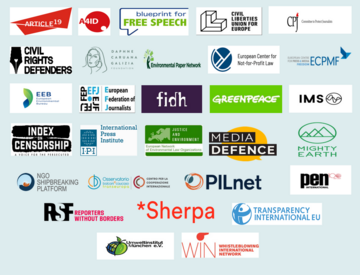
The initiative, which focuses on cross-border cases, is a crucial first step forward in the fight against abusive lawsuits against public watchdogs in Europe.
Strategic Lawsuits Against Public Participation (SLAPPs) operate through the litigation process to silence critical speech, shut down accountability, and undermine democratic rights. A CASE report published in March 2022 found a rising cumulative trend of SLAPPs in Europe since 2015.
EU Anti-SLAPP Proposals: A Broad Scope of Measures
CASE is deeply encouraged to see that the core safeguards and recommendations we have been advocatingfor over the past years, and that we discussed in our most recent policy brief, are included in the European Commission’s initiative. We welcome the broad personal scope of the proposed measures, recognising that SLAPPs are aimed at restricting transparent debate on issues of public importance and can impact anybody who wants to hold power to account. We strongly support the Commission’s approach in defining SLAPPs with cross-border implications, which takes into account how attempts to limit public participation resonate and impact public interest across borders, and welcome its recommendation that states ensure that safeguards be applied to all cases beyond the scope of minimum EU standards. We also note that the proposed anti-SLAPP law includes key safeguards and remedies identified in our research and articulated in our model directive, specifically an early dismissal mechanism (along with reversal of burden of proof, stay of proceedings, accelerated proceedings), a regime of sanctions, and remedial and protective measures (e.g. compensation of costs).
We also welcome the Commission’s recommendation to member states to review those laws which, by unduly limiting or chilling freedom of expression, make judicial systems vulnerable to abuse to silence critics, particularly rules on defamation. CASE has repeatedly underscored the importance of a holistic approach in tackling SLAPPs, including awareness-raising and legal training, support mechanisms and free legal aid, a review of ethical codes regulating lawyers, data collection, and reporting. We are glad to see these components fed into the European Commission’ proposals and remain open to ongoing engagement with the Commission and member states on the implementation process.
What next?
EU and national decision makers must genuinely engage on this initiative. Reaching a swift agreement on an ambitious EU anti-SLAPP law is the objective which must be pursued as a priority. The EU legislators - the European Parliament and the Council, with the help of the Commission - and national legislators must build on the Commission’s legislative proposal and work towards the strongest possible set of rules. Any attempts to weaken the minimum standards proposed by the Commission must be fought back.
Tags: SLAPP
This content is part of the Media Freedom Rapid Response (MFRR), a Europe-wide mechanism which tracks, monitors and responds to violations of press and media freedom in EU Member States and Candidate Countries. The project is co-funded by the European Commission.


